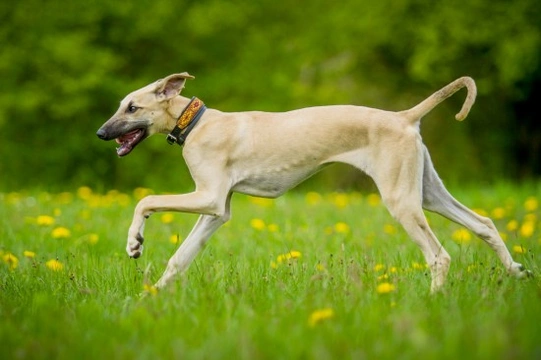
Caring for a Sloughi dog
The Sloughi is a sighthound dog breed that hails from North Africa, and is mainly found in Morocco as well as in various other North African countries. They are related to another sighthound breed, the Azawakh, but not the otherwise similar Saluki. They are a medium sized, lithe and lean breed with the typical sighthound build, and long, flat musculature but a less brawny appearance than the more common whippet and Greyhound.
They can be seen in a range of different colours, but too much white on the body is considered as a fault. For dog lovers who are enthusiastic about sighthounds but are looking for something a little different to the standard Greyhound or other common British dogs, the Sloughi may be worthy of consideration as a potential pet. If you are wondering if the Sloughi is the right choice of dog for you, in this article we will look at their care requirements and some commonly asked questions about the breed in more detail. Read on to learn more!
What is the Sloughi temperament like?
The Sloughi is considered to be one of the more intelligent of the sighthound breeds, and is alert, intuitive and rather sensitive in nature. They are gentle within the home, very affectionate and loving, and not prone to aggression or acting out. They do not like to be left alone for long periods of time, and very much enjoy the company of people, to the point that they may even follow you from room to room within the home.
How much exercise do they need?
A common misconception about sighthound breeds is that due to their very fast top running speed, they require incredibly high levels of exercise and prolonged periods of high-energy play. However in reality, other than a couple of short bursts of speed when out running, most sighthounds are very sedentary dogs, which spend a good proportion of their days asleep!
The Sloughi, however, does require rather more exercise than other equivalent breeds such as the greyhound and the lurcher, and they enjoy running around, varied exercise, and exploring new areas. However, their exercise requirements are not particularly onerous, and once they have worn themselves out, will be happy to doze and chill out within the home!
Are they easy to care for?
The Sloughi coat is very low maintenance, and requires little attention in the way of brushing and grooming. However, their coats are very fine and they are also not heavily padded with fat, and so can be prone to feeling the cold. When walking the dog in the colder weather, it is recommended to get them a warm coat or jacket, as well as possibly booties to protect their fine feet when the road is icy or covered in snow!
Are they easy to train?
The Sloughi is a rather reflective, sensitive dog breed that takes criticism or punishment very personally, and so they should be trained by means of calm, kind and reassuring positive reinforcement. Plenty of treats and praise is essential in order to keep the dog trying and working, and once they engage with you in training, they will try hard to please.
They are more than capable of retaining and executing a medium vocabulary of commands, but are unlikely to take well to complex chain commands or big challenges.
Do they have a strong prey drive?
As a sighthound breed, the Sloughi has a very highly tuned prey drive, and will always be on the lookout for potential prey when out on walks. When they spot something that may be a prey animal, they will take off after it without a second thought, and can be very challenging to train for reliable recall. It is important to work on the dog’s recall response on an ongoing basis, but also to be aware that following the command when in flight can be challenging for the dog.
When off the lead, the dog should always be muzzled for the protection of other animals, and should only be allowed off of the lead in enclosed areas away from large numbers of smaller wild animals, or domestic pets such as cats.
While the Sloughi may be able to learn to live with a cat as a housemate when properly introduced, this does not mean that such a skill will keep the dog from pursuing other cats outside of their own home!
What sorts of homes do they suit?
The Sloughi needs a medium sized home with a garden so that they can go out and stretch their legs, and they need to live in an area that has reasonably close access to a dog park or other safe, enclosed area where they can be allowed to run off the lead. They like to have plenty of company and do not thrive when left alone for long periods of time, and fit well into a family situation with children that like dogs and that will give them plenty of attention.
They are soulful, affectionate and loving dogs, and if you are able to understand their natures and fulfil all of their care requirements, make an excellent choice of pet for owners from all walks of life.



